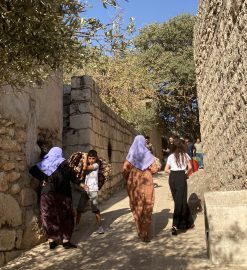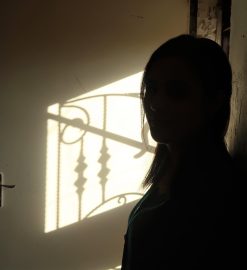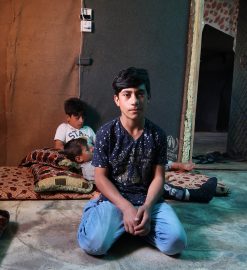Domestic violence increases among Syrian refugees
Publication: Al Monitor
AL-KHALDEYA, Jordan — Even when Hamda was still living in the city of Homs, her husband used to hit her. This didn’t happen a lot, but occasionally, when he was stressed out or tired. Most of the time he wasn’t even at home, since he worked outside of Syria a lot, so Hamda didn’t consider it to be a problem.
However, things changed when the Syrian war broke out and their neighborhood was bombed. One of their seven children died during an attack. Hamda’s husband was still mourning his dead son when all of a sudden he lost his job.
“And then things started to change rapidly. My husband got angry over the smallest things: money, how the kids behaved, what I was cooking. He started to beat me up for almost everything,” Hamda,40, told Al-Monitor.
Her husband often used a stick or an iron wire to beat her. More than once, her body was covered in bruises, sometimes in all kinds of colors. Although he never laid a hand on the children, they started to hate their father for the way he treated Hamda.
In the summer of 2013, she decided to flee to Jordan, partly to escape the war and partly to escape her husband. A few months after Hamda and her children arrived, she contacted her husband for the sake of their children. They discussed their problems, he said he was sorry and she allowed him to join them in al-Khaldeya, a town between the cities of Zarqa and Mafraq. In the beginning, everything was fine, until he fell back into his old behavior.
“When I asked him for money to support the kids, he started to hit me again. ‘Don’t you know that I don’t have that?’ he screamed. After that, I decided to leave him for good,” she said.
Hamda and her husband are still married. With the help of a lawyer, she is trying to arrange a divorce as soon as possible. Umm Ashraf from the Jordanian Women’s Union (JWU) helped her find a lawyer. In the last couple of months, the focus of the local JWU chapter has changed from helping Jordanian women into helping Syrian women. One of their main goals is to create a safe environment for Syrian children and women, which is much needed, said Umm Ashraf, a Jordanian woman who also lives in al-Khaldeya.
“Domestic violence among Syrian refugees is on the rise due to the poor living conditions, displacement and unemployment. The men cannot find jobs, feel useless and become severely depressed. As a result they start to beat their wives,” she told Al-Monitor.
Umm Ashraf’s phone is constantly ringing. Day and night she talks to Syrian women who live all over the country. One time she received a call from a 14-year-old girl who was forced to marry a man inside the Za’atari refugee camp, around 37 miles from al-Khaldeya, and the other day she received a call from a Syrian woman who was being beaten by her husband on a daily basis. Umm Ashraf talks to them, listens to them and supports them when they are ready to leave their husbands. Sometimes, they spend the night in her house.
“The biggest problem is that the women do not know their rights. Even if they are courageous enough to hire a lawyer, you see that most of them still go back to their husbands, sometimes after they got a divorce. Divorce is considered a shame in their culture,” she said, tying her black headscarf.
“Most Syrian women are afraid to lose their children to the husband’s family. Second, they find it hard to make a living as a single mom. Lots of them are already in debt,” she added.
There are approximately 10,000 Syrians living in al-Khaldeya, which makes up one-third of the population. Almost all of them rely on funding from the United Nations. The average salary in Jordan lies between $140 and $210 per month for 10-12 hour days, six days a week.
In front of the Jordanian Women’s Union building, dozens of women are begging for UN packages with cleaning material and towels. However, getting a free bag with cleaning supplies is not Nova’s main concern. The 37-year-old woman from Homs wants to leave her husband, but she is afraid that he will take the children once they are divorced. Right after bombings destroyed parts of her neighborhood, her husband started to beat her. And even after they fled to Jordan, two years ago, he continued the abuse.
“The last time he hit me was a week ago. He insulted me in front of the children, I told him I didn’t like it and then he started to kick and hit me. We live in a small house with no privacy; my husband doesn’t have a job. Small things make him lose his temper and I don’t have a place to go,” she told Al-Monitor.
A few months ago, her husband tried to strangle her. She passed out for a few minutes, but survived the attack. After that incident, he apologized. The abuse stopped for a few weeks, until she did something “wrong” and he started beating her again.
“He cannot control himself,” Nova cried. “Sometimes I am afraid to die.”
According to Umm Ashraf, lots of Syrian women feel ashamed to talk about their problems at home because it isn’t in their culture to discuss domestic violence. However, in the last couple of months she noticed that more and more women were opening up to her.
“It has to do with the fact that they are in a different country now. They do not feel the pressure of their families back home anymore. Also, they see others getting legal counseling, which encourages them to stand up for themselves,” Ashraf said.
Like most of the Syrian women who suffer from domestic violence, Nova thinks that her husband feels less like a man now that he cannot support his family. Asked what would be a perfect solution to get her out of this situation, she doesn’t talk about getting a divorce, rather about going home:
“I wish the war in Syria would stop so that we can go back. Before the revolution, we had a good marriage. We simply had a good life.”



Leave a Reply